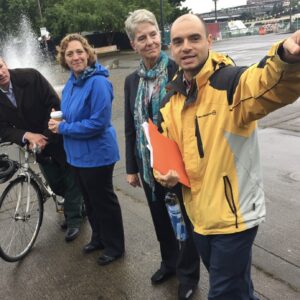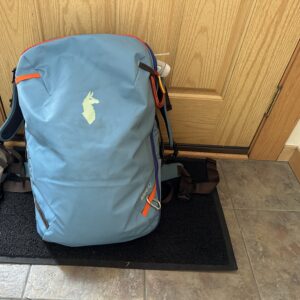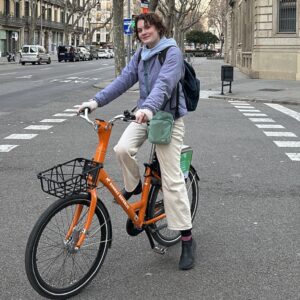As a transportation planner at the Bureau of Transportation (PBOT), Denver Igarta has had a front-row seat to the development of Portland’s burgeoning network of low-stress, “neighborhood greenway” streets. Now Igarta will head to Europe to “uncover the secrets of residential streets that were built to first serve people rather than cars.”
Igarta has been selected as an Urban and Regional Policy Fellow by the German Marshall Fund. His research will include a one-month, four city tour with stops in Munich, Germany; Rotterdam, Netherlands; Copenhagen, Denmark; and Malmö, Sweden.
Igarta says he’ll be on the lookout for streets where, “you can cross without ‘looking both ways’ first; you can take a carefree stroll or bike ride; invite the neighbors to gather and interact; my 6-year old can play on without my constant supervision; allow kids to live active lives and learn independence (close to home).”
A great example of this would be PBOT’s NE Holman pocket park project.
We need more streets like that in Portland and having real-life examples to draw from — and people at PBOT that know how to make it happen — is very important.
Along with chief bike planner Roger Geller, PBOT already boasts some of the best and brightest when it comes to developing people-friendly residential streets. PBOT Traffic safety specialists Mark Lear and Greg Raisman were invited to give a presentation in Seattle (and were lovingly dubbed the “backstreet boys”).
Igarta will be blogging his experiences along the way. Good luck Denver!








Thanks for reading.
BikePortland has served this community with independent community journalism since 2005. We rely on subscriptions from readers like you to survive. Your financial support is vital in keeping this valuable resource alive and well.
Please subscribe today to strengthen and expand our work.
How fresh to see a Portland transportation advocrat go to Europe to study their liveable streets! I believe this may be a first and very exciting since no one from PBOT has ever been there nor can find any information on the Internet or in scholarly papers about the topic.
We should study this for at least another decade or two before sitting down to draft an aspirational, non-binding statement of intent to explore the possibility of building liveable streets and alternative transportation infrastructure in Portland.
Spot on. And hasn’t our proud mayor also been overseas while on the clock a number of times with similar agendas and, ahem, “goals”???
So true! These best practices have been exhaustively documented in so many forms — in books, case studies, film and video, on the net, etc. If you want to design streets that you don’t have to look both ways on before crossing, that are safe for children and families, I’ll give you a hint how: take the cars away.
I think it’s great Denver is going, and I hope what he learns there he can bring back to us here in Portland, but somehow I don’t think sending a PBOT staffer to Europe is going to have much of an impact overall. Now, sending someone from ODOT, or even a random member of the motorist public to show them there is another way of doing things… THAT could make a difference.
Dude, I want that job!
Isn’t it a little strange to burn that much fossil fuel in order to research ways to not burn fossil fuels? Seems like a lot of this type of study could be done over the internet and with video conferencing.
Anyway, don’t mind me, I’m just jealous…
There is no substitute for being there and experiencing it firsthand and talking with the people who design, maintain and use it every day.
Street are complex three-dimensional organisms that rely on all senses to experience. All the video conferences, photos, movies, and internet magic in the world can’t inspire great ideas the same way a visit to world-class examples can.
Good Luck Denver!
Anyone who has worked with Denver has benefited from the knowledge and perspective on international best practices that he brings to projects. The unique insight he’s able to share because of his experiences living, working, and studying abroad in the world’s most pedestrian-, bike-, and people-friendly cities just flat out makes entire project teams better. That results in better implementation – plans, policies, and infrastructure – that everyone can enjoy.
I’m looking forward to learning more about livable communities through this latest study tour. Congrats to Denver on being selected for this honor!
It’s also worth noting that these trips aren’t just about learning the nuts and bolts policies… They’re about lighting a fire and a passion about transforming our streets away from the auto-centric status quo that has dominated America for way too long. If we stand to have any chance against the entrenched mindsets, City staff need to be advocates and they need to not just understand the planning and policies… They need to believe in it. Often this takes first-hand experience.
Unfortunately its all about traffic laws and cultural values. You can build a woonerf here, hell, NW 13th is pretty much one but if motor vehicles dont yield to bikes and peds, and motorists feel they still own the road and have the right-of-way, you havent got a woonerf regardless of street design. Again with ‘shared space’ and removing traffic signs, both would never work here either, not because they physically cant be built here but that Americans cant comprehend how they work given our traffic laws and cultural values.
Oh come on… We can men to space, but can’t live without traffic signs? With that attitude, nobody would ever eat broccoli… We should at least try it!
Congrats, Denver, I look forward to reading your blog posts, and seeing new things implemented in Portland based on your observations.
Ted Buehler
One of the coolest thing i saw in Germany was a two way residential road that narrowed to one lane. Just like an old one lane bridge. There were no stop signs or yield signs, and on both sides of the streets where large planting areas with trees.
Maybe PDOT should have planners from other countries come and work at their office for a year, i.e. an exchange program.
This would be amazing
Glad they’ll be going to Malmo! My hometown! I hope they visit the many residential areas that are completely car free! Now those are places where children roam safely!
Just last Saturday we had a neighborhood organizing event for Greenways, led by a young PhD student who was totally inspired by Greg & Mark’s presentation here in Seattle. And that’s just one of two neighborhood groups that I know of which started up as a result of meeting Greg & Mark.
Thanks to everyone from PBOT for spreading the love.
Hamburg still has the best mass transit and bike network I’ve been on. Looking at a mass transit map makes me long for a dedicated rapid rail system in the Portland area (since they’re about the same size). This is just the rail, with tons of buses serving the areas between the gaps: http://tams-www.informatik.uni-hamburg.de/applets/jfig/gallery/hvv-plan-big.png
Thank you, Jonathan, and others for your best wishes. I am grateful that the German Marshall Fund believed enough in my research proposal to sponsor my trip. I feel this tour has been years in the making, starting back when I was at graduate school in Germany, on through the exhaustive research of best practices for the Portland Bicycle Plan, and to my current project in the Cully neighborhood (to develop local street solutions that give neighbors travel options). I know I now have a better sense of what lessons will transfer well back at home and more insight for how to find them. Yours, Denver